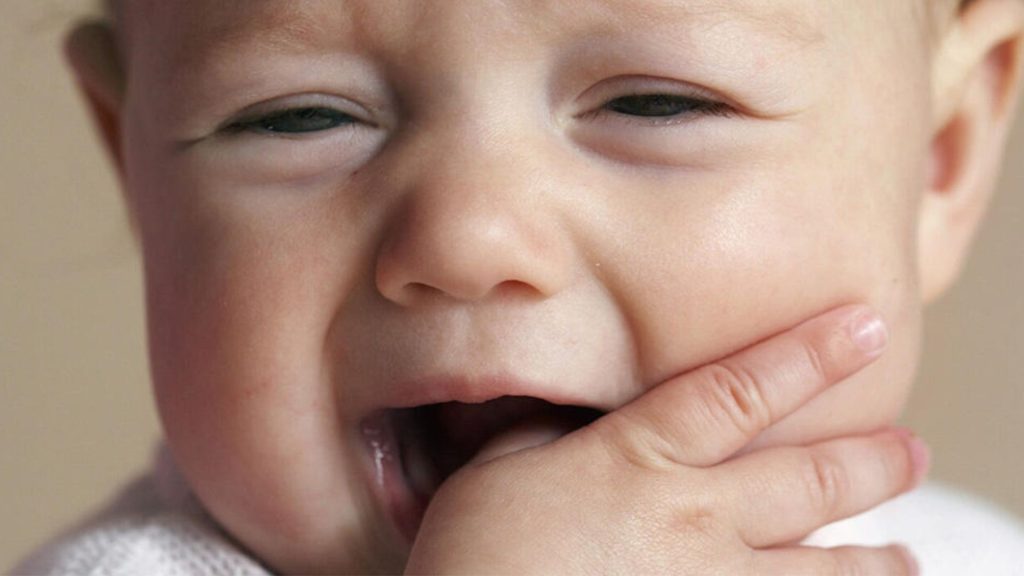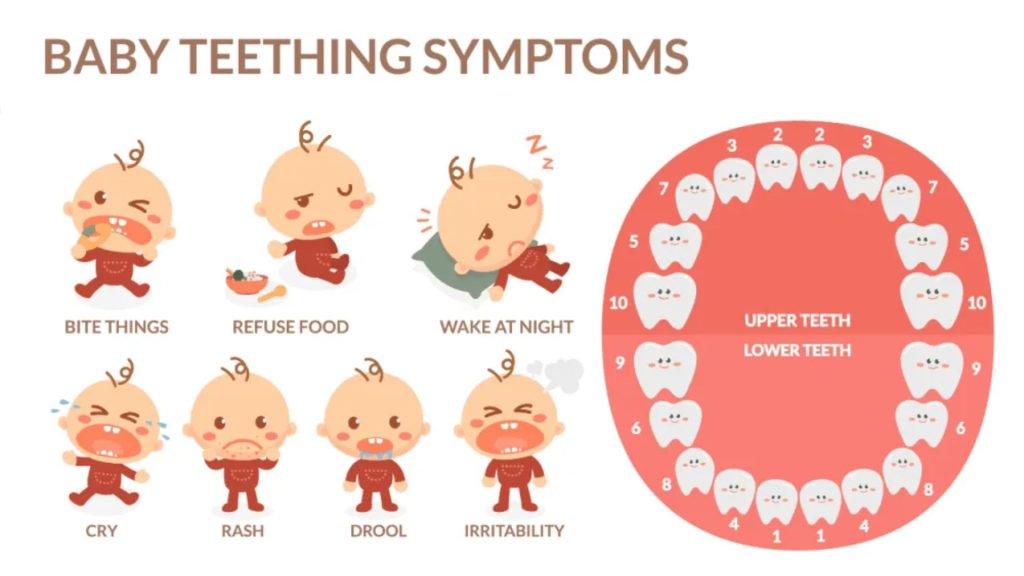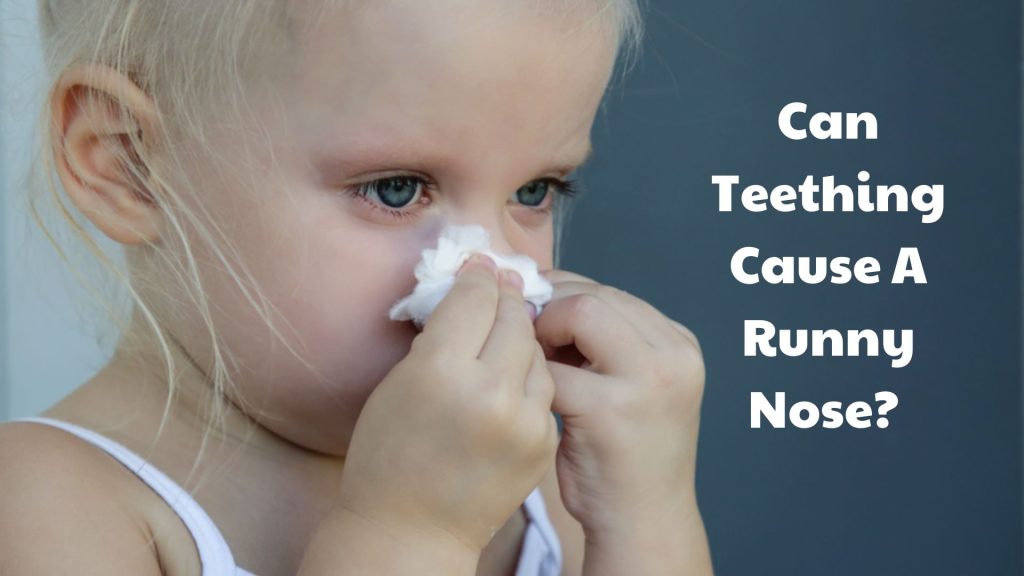Can teething cause a runny nose? No, teething does not cause runny noses. Parents might expect a runny nose or more drooling from their teething babies. Many misconceptions and misunderstandings surround teething, a key milestone for your infant. That teething produces runny noses and stands out. This post dispels this misconception and explains how teething affects your baby’s nasal passages.
The Teething Process

Consider the mouth of your infant a building place. Under the surface, much is happening. Baby teeth (deciduous or primary teeth) appear at 6 months of age. This event’s preparation gets started early.
Teeth, even very young ones, begin developing while a baby is still within the mother’s womb. They’ve been hiding under the gums, waiting for their signal. Symptoms of teething include discomfort in the gums. As the curtain goes up on a big show, they’re like them. The gums become swollen and painful. Your child is grumpy due to this pain. Hey, who wouldn’t be grumpy when new neighbors are moving in next door, right?
Back to teeth. Your teeth take a little elevator once your gums are ready. They emerge through the gums. Each tooth gets a “Hello, world!” moment. The procedure continues for many years until your baby has pearly whites.
Baby Teething Symptoms

The teething process is blamed for restless nights, “I just want to be held” moments, runny noses, and pink cheeks. As little teeth come in, they typically accompany symptoms that may make you and your infant inquisitive. Here’s what to anticipate during teething:
- Sore Gums.
- Runny nose.
- Drooling.
- Chewing Everything.
- Irritability.
- Changes in Eating Habits.
- Low-Grade Fever.
However, each infant is different and may not exhibit all these symptoms. Teething is transient, and these symptoms will go away as those gorgeous baby teeth grow into a perfect grin.
Can Teething Cause A Runny Nose?

No, your baby’s new teeth aren’t little faucets for a runny nose. Right now things start to get interesting. Your dental assistant, great-aunt, and even your mother may have warned you that your infant may have some nasal drainage during the teething process. Traditions like these are carried along.
The catch: it’s not guaranteed. Not all teething infants have runny noses. One of those childhood peculiarities. Some may become sniffly, others won’t. If your neighbor’s kid had a runny nose during teething but yours didn’t, that’s normal.
The Truth About Teething and Runny Noses
So, we’ve learned that teething doesn’t directly cause a runny nose. However, there is still more dental science to investigate in order to completely comprehend the link. Small teeth push through the gums during showtime, causing gum irritation. This inflammation is like a cut’s redness and swelling. The body reacts to discomfort. Sometimes gum irritation causes the “gag reflex.” Your baby’s gag reflex clears the throat and nasal passages to avoid choking. A somewhat runny nose may follow as the body strives to keep things clean and safe.
Moreover, your teething baby may soothe their sore gums by putting their hands or toys into their mouth. It is possible that this heightened activity may cause saliva to flow. Saliva may cause drooling, which can drip down your baby’s chin and cause congestion or a runny nose.
It’s important to realize that this runny nose is usually not an indication of a medical condition. It’s more of a side effect of the teething process and is typically just transitory. No colds or respiratory difficulties result from teething.
How to Relieve Runny Noses In Teething Babies?
Your teething infant has a runny nose, and you want to make them feel better. No worries—we have sniffle-relieving tips:
Try saline drops for congestion, clean your baby’s runny nose with a soft cloth, and keep them hydrated.
Humidifiers and crib mattress elevations may help relieve dry nasal passages and congestion.
Also, toys designed for teething babies may help soothe aching gums and reduce excessive drooling, which can cause stuffy noses.
Remember that every infant has different symptoms. For severe runny noses or other symptoms, visit a physician, but rest assured that teething, like other stages, is transitory and your baby will soon be back to their cheerful, smiling self with a little extra love and care.
When to See a Dentist for a Runny Nose from Teething?
While teething seldom causes serious difficulties, there are a few instances when seeing a healthcare professional is advisable. If your baby’s runny nose is severe, persistent, or accompanied by a high fever, unusual nasal discharge, or substantial discomfort, see a doctor. Teething causes runny noses, and mild symptoms are typical.
If you’re concerned about your baby’s health or observe weird symptoms, consult a dentist. Never ignore your instincts. Choose the Best for Your Child’s Smile! With the Children’s Dental Benefits Program, Spring Orchid Dental Clinic provides excellent children’s dental care.
Make an appointment now!
FAQs
Can A Baby Have A Runny Nose And Not Be Sick?
Yes, a baby may have a runny nose and not be unwell. Babies with runny noses aren’t usually sick. Many things may trigger a baby’s runny nose without sickness. Some frequent explanations are:
- Teething.
- Environmental Allergens.
- Irritants.
- Temperature Changes.
- Normal Development.
In most babies, a runny nose isn’t anything to worry about. However, if the runny nose persists, is accompanied by other symptoms, or you have concerns about your baby’s health, visit a doctor.
Why Do Babies Get Cold Symptoms When Teething?
Babies may have cold-like symptoms when teething, but they are not cold. Instead, several factors cause chilly feelings during teething:
- Increased Saliva Production: Babies salivate with teething. Drooling and saliva flowing down the throat might induce a minor cough or stuffy or runny nose.
- Gum Inflammation: Teething causes gum inflammation and pain when babies’ teeth emerge through the gums. Babies may get fussier when their gums swell and grow sensitive, which might be misinterpreted for disease.
- Hand-to-Mouth Activity: Teething newborns place their hands, fingers, or teething toys in their mouths to calm their gums. This may cause mild infections that resemble cold symptoms by introducing environmental microorganisms into their mouths.
- Lowered Immune Response: Teething may temporarily weaken a baby’s immune system, leaving them more vulnerable to cold symptoms from mild illnesses or irritations.
Parents must distinguish teething signs from disease. While teething may produce runny noses, low-grade fevers, and irritability, it is not a significant issue. If you’re unclear about your baby’s condition or if symptoms increase, visit a doctor.
Does Teething Weaken Immunity?
Teething does not permanently decrease a baby’s immune system. However, it may temporarily alter their immunological response. Teething-related stress and inflammation may temporarily lower immunological effectiveness, rendering newborns more vulnerable to mild illnesses. One reason for this is greater hand-to-mouth action when newborns put things, including their hands, in their mouths to soothe their gums. This practice may spread germs and bacteria, causing mild illnesses. Mild symptoms including low-grade fevers, mild congestion, and fussiness might be misconstrued as a disease. Parents must distinguish teething symptoms from sickness since these immunological changes are transitory and resolve after teething.





